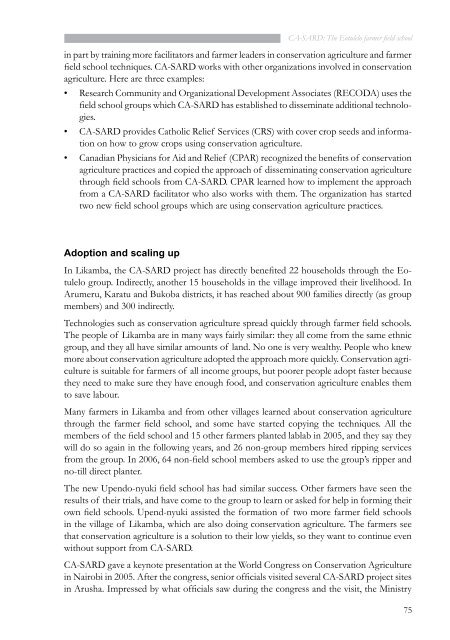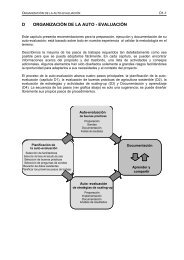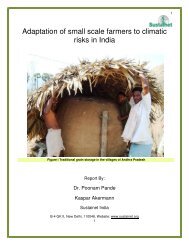cases from tanzania - Sustainet
cases from tanzania - Sustainet
cases from tanzania - Sustainet
You also want an ePaper? Increase the reach of your titles
YUMPU automatically turns print PDFs into web optimized ePapers that Google loves.
CA-SARD: The Eotulelo farmer field school<br />
in part by training more facilitators and farmer leaders in conservation agriculture and farmer<br />
field school techniques. CA-SARD works with other organizations involved in conservation<br />
agriculture. Here are three examples:<br />
• Research Community and Organizational Development Associates (RECODA) uses the<br />
field school groups which CA-SARD has established to disseminate additional technologies.<br />
• CA-SARD provides Catholic Relief Services (CRS) with cover crop seeds and information<br />
on how to grow crops using conservation agriculture.<br />
• Canadian Physicians for Aid and Relief (CPAR) recognized the benefits of conservation<br />
agriculture practices and copied the approach of disseminating conservation agriculture<br />
through field schools <strong>from</strong> CA-SARD. CPAR learned how to implement the approach<br />
<strong>from</strong> a CA-SARD facilitator who also works with them. The organization has started<br />
two new field school groups which are using conservation agriculture practices.<br />
Adoption and scaling up<br />
In Likamba, the CA-SARD project has directly benefited 22 households through the Eotulelo<br />
group. Indirectly, another 15 households in the village improved their livelihood. In<br />
Arumeru, Karatu and Bukoba districts, it has reached about 900 families directly (as group<br />
members) and 300 indirectly.<br />
Technologies such as conservation agriculture spread quickly through farmer field schools.<br />
The people of Likamba are in many ways fairly similar: they all come <strong>from</strong> the same ethnic<br />
group, and they all have similar amounts of land. No one is very wealthy. People who knew<br />
more about conservation agriculture adopted the approach more quickly. Conservation agriculture<br />
is suitable for farmers of all income groups, but poorer people adopt faster because<br />
they need to make sure they have enough food, and conservation agriculture enables them<br />
to save labour.<br />
Many farmers in Likamba and <strong>from</strong> other villages learned about conservation agriculture<br />
through the farmer field school, and some have started copying the techniques. All the<br />
members of the field school and 15 other farmers planted lablab in 2005, and they say they<br />
will do so again in the following years, and 26 non-group members hired ripping services<br />
<strong>from</strong> the group. In 2006, 64 non-field school members asked to use the group’s ripper and<br />
no-till direct planter.<br />
The new Upendo-nyuki field school has had similar success. Other farmers have seen the<br />
results of their trials, and have come to the group to learn or asked for help in forming their<br />
own field schools. Upend-nyuki assisted the formation of two more farmer field schools<br />
in the village of Likamba, which are also doing conservation agriculture. The farmers see<br />
that conservation agriculture is a solution to their low yields, so they want to continue even<br />
without support <strong>from</strong> CA-SARD.<br />
CA-SARD gave a keynote presentation at the World Congress on Conservation Agriculture<br />
in Nairobi in 2005. After the congress, senior officials visited several CA-SARD project sites<br />
in Arusha. Impressed by what officials saw during the congress and the visit, the Ministry<br />
75




